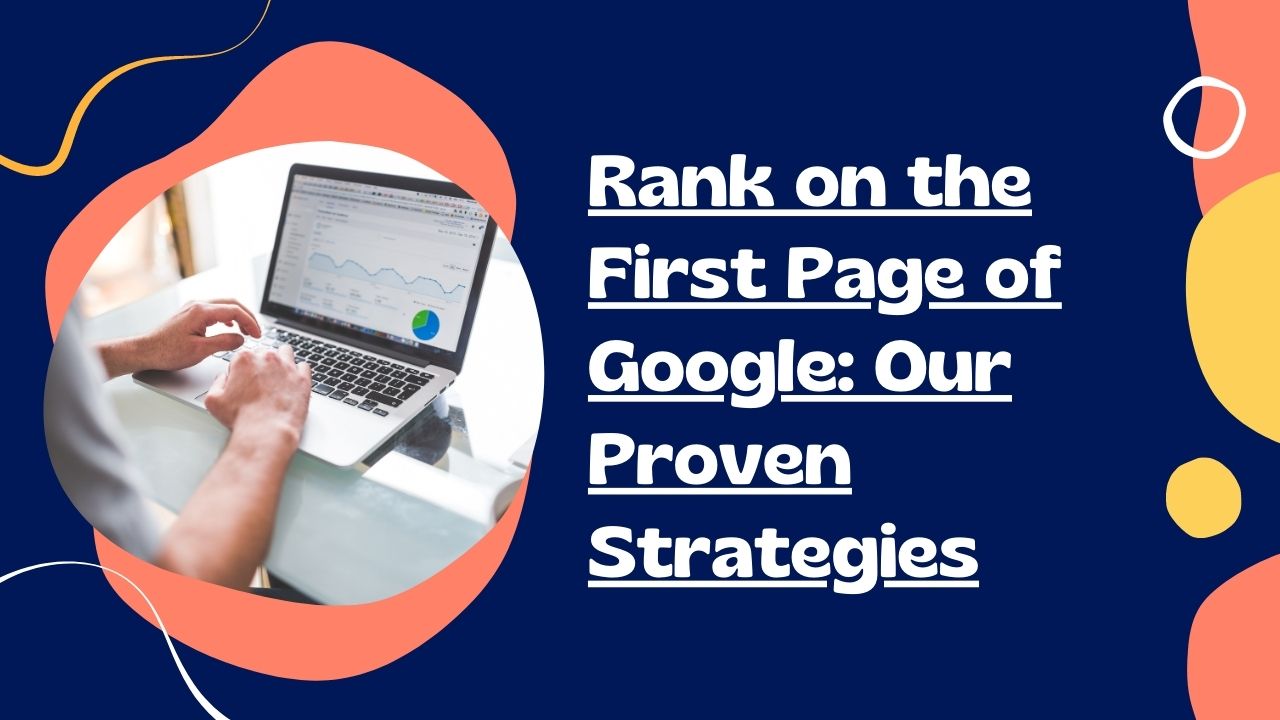Are you struggling to get your website to rank on the first page of Google? As an SEO specialist, I understand the importance of having your website rank high in search results. Ranking on the first page of Google is critical to the success of your online business. Studies have shown that the first page of search results receives 95% of all search traffic. If your website is not on the first page, you are missing out on potential customers.
But don’t worry, with our proven strategies, you can rank on the first page of Google and increase your visibility online. In this article, we’ll cover the key strategies to help you achieve this goal.
1. Keyword Research
Keyword research is the foundation of any SEO campaign. The first step is to identify the keywords that your target audience is using to search for your products or services. You can use tools like Google Keyword Planner or Ahrefs to find relevant keywords.
Once you have identified your target keywords, you can optimize your website’s content, including meta tags, page titles, and descriptions, with those keywords. However, it’s essential to avoid keyword stuffing, which can hurt your rankings. Instead, use keywords naturally in your content.
2. On-page Optimization
On-page optimization is the process of optimizing individual pages on your website to rank higher and earn more relevant traffic from search engines. This includes optimizing your title tags, header tags, meta descriptions, images, and content for your target keywords.
Make sure your content is high-quality, informative, and engaging. Use descriptive header tags (H1, H2, H3) to help search engines understand the structure of your content. Use alt tags to describe your images to make them more accessible to search engines.
3. Technical SEO
Technical SEO refers to the process of optimizing your website’s technical elements to improve its visibility in search engines. Technical SEO includes optimizing your website’s load speed, mobile-friendliness, URL structure, and internal linking.
Make sure your website is fast and easy to use on mobile devices. Use descriptive, keyword-rich URLs that are easy to understand. Use internal linking to help search engines crawl your website and understand its structure.
4. Content Marketing
Content marketing is a crucial aspect of SEO. It involves creating and sharing high-quality, valuable content to attract and engage your target audience. Content marketing includes blog posts, videos, infographics, and social media posts.
Make sure your content is well-researched and informative. Use visuals like images and videos to make your content more engaging. Share your content on social media and other online platforms to reach a wider audience.
5. Link Building
Link building is the process of acquiring high-quality links from other websites to your own. Google views backlinks as a vote of confidence in your website’s content. The more high-quality backlinks you have, the more likely you are to rank higher in search results.
There are several ways to build backlinks, including guest blogging, broken link building, and influencer outreach. Make sure the websites linking to your content are high-quality and relevant to your niche.
Frequently Asked Questions (FAQs)
Q. How long does it take to rank on the first page of Google?
A. There is no one-size-fits-all answer to this question. It depends on several factors, including the competitiveness of your niche, the quality of your content, and the effectiveness of your SEO strategy. It can take anywhere from a few weeks to several months to see results.
Q. Can I rank on the first page of Google without backlinks?
A. It’s possible, but it’s challenging. Backlinks are an essential ranking factor for Google, and it’s unlikely that you’ll rank on the first page without them. Focus on creating high-quality content that people want to link to and promoting it through various channels to earn backlinks naturally.
Q. How often should I update my website’s content?
A. Regularly updating your website’s content can help improve your rankings. The frequency of updates will depend on your niche and the type of content you publish. A blog, for example, should be updated at least once a week. However, it’s more important to focus on creating high-quality, evergreen content that provides value to your audience.
Q. What is the best way to measure the success of my SEO strategy?
A. There are several metrics you can use to measure the success of your SEO strategy, including search engine rankings, organic traffic, backlinks, and engagement metrics like bounce rate and time on site. Use a combination of these metrics to track your progress over time and adjust your strategy accordingly.
Q. How can I optimize my website for local SEO?
A. If you have a physical location, optimizing your website for local SEO is essential to attract local customers. This includes adding your business to local directories, optimizing your Google My Business listing, and creating location-specific content. Make sure your website includes your business’s name, address, and phone number (NAP) to make it easy for customers to find you.
Q. How to choose the best SEO company in Kuala Lumpur, Malaysia?
A. There are many factors to consider but in essence you may want to read this article here for more information.
Visit https://linktr.ee/thebestseocompanyever for other related links to our SEO services.
